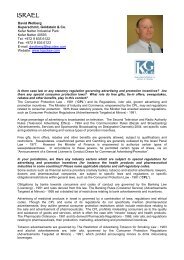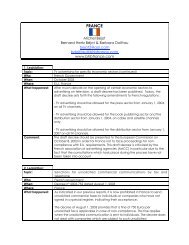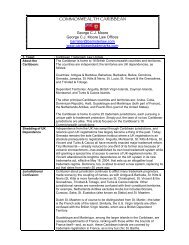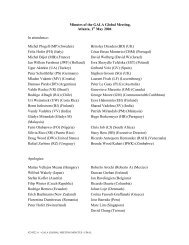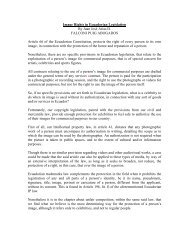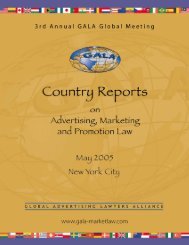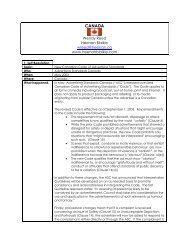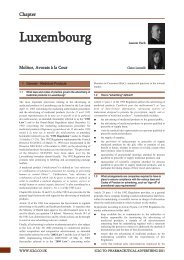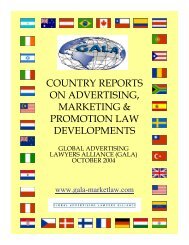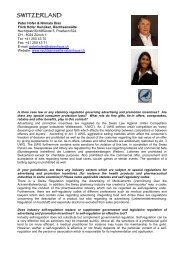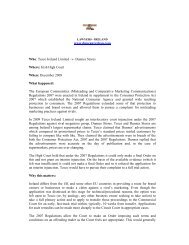International Advertising Clearance - May 2004 - GALA
International Advertising Clearance - May 2004 - GALA
International Advertising Clearance - May 2004 - GALA
You also want an ePaper? Increase the reach of your titles
YUMPU automatically turns print PDFs into web optimized ePapers that Google loves.
Television: Yes No<br />
Radio Yes No<br />
Internet Yes No<br />
Print Yes No<br />
Outdoor Yes No<br />
A: Tobacco cannot be advertised in the above media. (Notably the last vestige of<br />
tobacco advertising --- a small amount on signage will also be prohibited after October<br />
1, 2003). Prescription drugs are limited to claims about cost/quantity and name.<br />
Generally, alcohol may be advertised in the above media provided ads meet federal<br />
broadcast guidelines for tv/radio and applicable provincial alcohol advertising<br />
regulations/guidelines.<br />
Q: What is your country’s law on privacy and/or rights of publicity regarding the use of famous<br />
people in advertising without their express permission?<br />
A: Canada’s federal privacy legislation, Personal Information Protection and<br />
Electronic Documents Act, (“PIPEDA”) currently requires informed consent for the<br />
disclosure of individuals’ personal information outside a province for consideration. On<br />
January 1, <strong>2004</strong>, informed consent must be obtained for the collection, use, disclosure of<br />
personal information going outside a province. PIPEDA does not apply within a<br />
province that is deemed to have “substantially similar” legislation to PIPEDA. Quebec<br />
has its own privacy legislation and other provinces are developing privacy legislation too.<br />
Several provinces have the common law tort of “misappropriation of personality”<br />
(developed largely in Ontario) which refers to using person’s image/personality in<br />
advertising without their consent for commercial purposes (i.e. often based on the notion<br />
of an implied endorsement of a product/service without the consent of a celebrity<br />
although, a non-celebrity complainant could also be successful). Other provinces<br />
(British Columbia, Saskatchewan, Manitoba, Newfoundland and Quebec) have privacy<br />
statutes that prohibit the use of a person’s personality/image in certain situations (often<br />
the advertiser’s intention to use the person’s image without their consent will be<br />
material).<br />
Q: What is your country’s law on the use of other people’s products in advertising without the<br />
product owner’s permission? For instance, if a mustard company used a very recognizable<br />
automobile as part of its advertisement, would the automobile company have a right of action<br />
against the mustard company for false affiliation or false endorsement?<br />
A: Yes<br />
They may have a right of action in connection with use of the car’s trade mark especially<br />
if the trade mark is registered for “services” in which case advertising constitutes “use” of<br />
a trade mark.<br />
Q: Are there any restrictions or regulations with respect to price advertising?<br />
A: The federal Competition Act has requirements and guidelines concerning the<br />
determination of prices used in price claims with respect to the “ordinary price” that is<br />
referenced in the ad. Price claims must meet a “time test” or a “volume test. The ASC<br />
Code has similar provisions.



